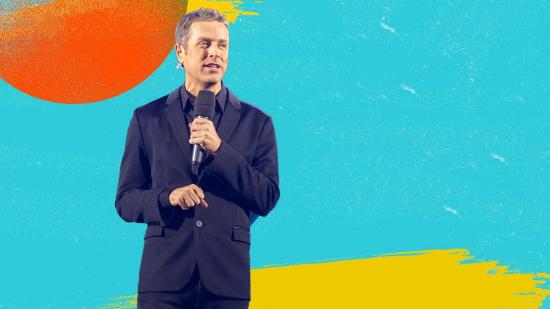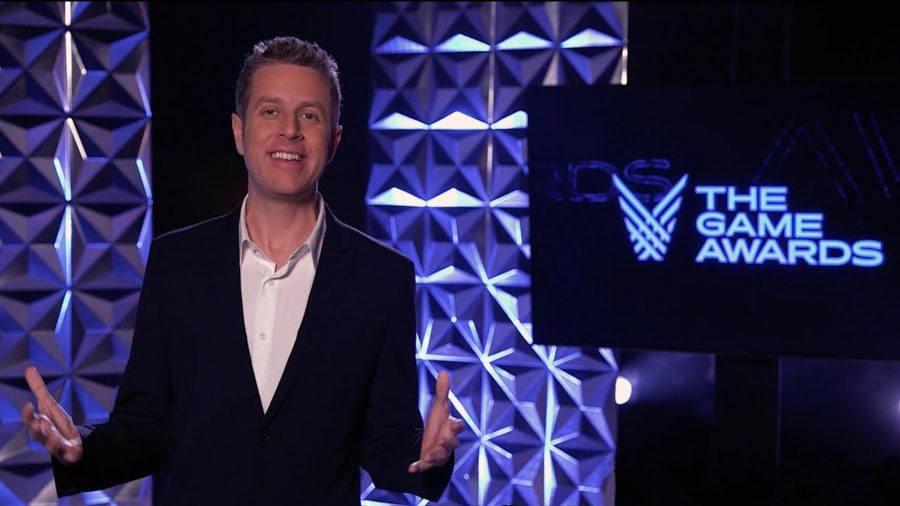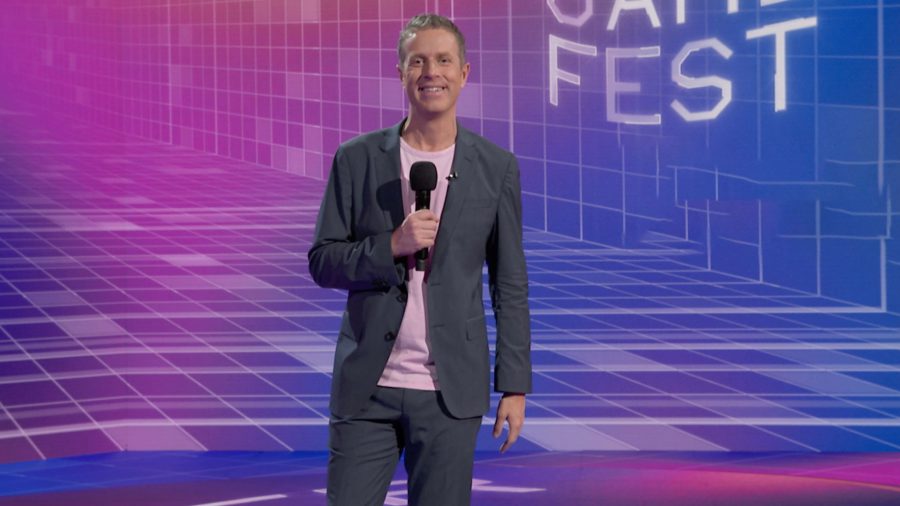The skyline of New York City looms large behind Geoff Keighley as he sits nestled in the top of an equally tall building. The iconic videogame veteran has carved out a chunk of his precious time to speak with The Loadout ahead of Summer Game Fest, and we get right down to brass tacks.
“I’ve been to every physical E3 since it began in 1995,” Keighley says when we broach the topic of E3, which has been, up until now, the quintessential gaming event. It’s clear that E3 holds a special place in the former producer’s heart, but it’s also clear that the show has quickly been losing relevance among consumers and the industry with its failure to adapt and evolve as time has gone on.
“E3 ultimately ended up sort of having a participation problem, where a lot of the bigger companies weren’t going,” Keighley says. “I remember in 2020, the year of the PlayStation 5 launch and new Xbox, Sony not being there’s a pretty major problem for E3 when PS5 was an object of desire and wasn’t a part of it. So, I think, it’s always difficult for me because I love what E3 represented, but I think E3 hasn’t been the real E3 for quite a number of years.”
Our conversation turns to how Geoff Keighley’s events – Summer Game Fest and The Game Awards – provide a better solution to the modern world of videogames than E3, though he’s keen to make clear they are not replacements for the classic event, nor does he intend them to be competitors per se. “They’re just sort of different expressions and different ways of approaching how to programme an event. E3 has traditionally been a physical event, where you pay to attend; Summer Game Fest is a completely free event that’s streamed globally as a live stream that communicates news and information on games. In some ways, it’s more similar to a Nintendo Direct or a State of Play than an E3.
“So, it’s a different format of communicating news to fans, and I think it’s more efficient. So, yes, it is a different format, but I don’t see it as necessarily replacing E3. And Game Awards, same thing. It’s an award show that also has news inside of it. So, yeah, I do think our shows are more digital and more global. And that’s something that’s been a benefit to us.”
Keighley’s shows cost a lot of money, and that money has to come from somewhere – namely advertising and sponsorships. He’s faced criticism from fans before about the number of ads in a show before and he knows it, but he points out that the Xbox showcase, for example, is also one big advertisement for the company’s games.
“Yes, my shows have advertising in them. That’s how we pay for the shows,” Keighley points out. “And I think one of the things that is important to note is that if I’m Xbox, or PlayStation, or Nintendo, I’m spending my own internal company money, marketing money, to do that. For us, we have to figure out a way to subsidise the shows and pay for them, and that’s through advertising.” He elucidates his point by highlighting how The Game Awards has gone from the ill-fated Schick Hydrobot in 2016 to more premium sponsors like Spotify and Verizon.
One of the other options that Keighley’s been bouncing around is crowdfunding. “I guess we could start a Patreon or we could find some other way. I’ve toyed with that idea, maybe one year at Game Awards we’ll have a slot where fans can buy it and do whatever they want with it.’”
During our conversation, it’s clear Keighley thinks a lot about balance and what his audience want to see. People watch his shows to celebrate and get excited about games, after all, but these are issues he’s fully cognisant of, even if there is no easy solution. Take Summer Game Fest for example: “It’s a very clear premise – we’re going to be showing you a lot of videogame trailers, and that’s what the show is. If you want to watch that, great; if not, you know, watch the highlights the next day on the internet. So, yeah, I get the conversation and I see it all. I’m fully aware of it. But, you know, that’s just sort of the model that we have and that tends to work pretty well for most people.”

But, the real differences between Keighley’s shows and more traditional, press-focused events that E3 is representative of are the way that Summer Game Fest and The Game Awards are far more democratic; the content is delivered directly to the consumer with initiatives like Future Class, which asks the community to recognise the ‘inclusive future of videogames,’ or getting demos directly to people’s machines via Steam. In other words, nobody misses out.
“That’s deliberate,” Keighley tells us. “I think one of the things that I really found with The Game Awards was how global our show was, and the fact that people in China and India and other countries really wanted to watch the show and be a part of it.” He knows that living in Los Angeles means he is just a stone’s throw away from most industry events, but most people aren’t so fortunate. “I always try to think of the kid in Stockholm, Sweden, or in the outskirts of Germany, who’s probably never going to get to go to an E3, but wants to feel a part of something. And to democratise that experience is really important.”
Keighley’s shows certainly mark a new era of inclusivity; of breaking down the gate-keeping of having to be invited to an event, and being a member of the press to get shown the latest and greatest behind closed doors. Now, people can be involved from the comfort of their homes.
“I see a world in five years where you’re gonna watch one of my shows – maybe from within a metaverse game – and then all of a sudden you’ll walk through a portal to play that demo,” Keighley says. ”That’s the kind of stuff that I think is coming down the road. And it is very democratic – everyone can have access to it.”
With two mammoth events a year to organise, plan, and implement, Keighley is more busy than you could imagine. “These things are kind of year round experiences. I always joke that someone will come up to me in October and say, ‘Hey, when are you gonna get started on The Game Awards?’ And I’m like, ‘No, we’ve been working on it for the past year.’” Keighley admits that Summer Game Fest is “a five or six months process” and that work has already started on The Game Awards in December.
Two events a year might not sound like much, but a lot is riding on them. “The back half of my year is kind of working on Game Awards,” Keighley says, “which is always a stressful thing to think that your whole year is being reduced down to like a two-hour live show. But yeah, it’s a pretty full time thing. Especially The Game Awards, given the scale of that show and the talent and the physical event and the orchestra and all that stuff, it takes a long time to coordinate.”
And when so many videogame announcements are relying solely on you and your hosting abilities, the pressure is on to present an immaculate show. “The thing I really always feel is a real obligation to a lot of these game developers that trust us with their announcements,” Keighley tells us. “If you’re gonna spend two or three years working on a game and then decide we’re going to work with Keighley to announce it at this show, you want it to be perfect for them.
“It’s a real bummer when sometimes things go awry, and in the past 20 years, there have been a few cases where we’ve cut off a trailer too soon, or there’s been a problem with something and you’re devastated because someone trusts you. So, my team and I work really hard to try and be perfect in terms of how we present the content that we’re given. And then the other aspect of fear is knowing that we don’t make the games, so the announcements we have in our shows are really whatever’s available to us from the game companies. I live in a constant state of fear that there might not be good announcements for the show.”
Elden Ring was last year’s huge Summer Game Fest announcement, and that clearly weighs on Keighley, who is conscious that there are few things that can top that level of hype. “It’s not like I have a secret game development studio where we can get a trailer ready for Summer Game Fest,” he jokes. “You just have to hope that the game companies have good stuff.
“I’ve been lucky that it usually works out, but every show is different and I go into every show worried about how the line-up is going to turn out. Most years, I look at it at the end and think ‘yeah, this is pretty good.’ But, if you asked me what the Game Awards line-up looks like this year, I’m in total fear. Like, what are we gonna have?
“And, also, a lot of things change. Even now, we have games that are like dropping in and dropping out because they’re not ready. So, the most heartbreaking part of these shows is thinking you have something and then a month or two later hearing the game has been delayed. So, there are lots of stories of heartbreak on these shows, too.”
Despite the fear and the heartbreak, Keighley is pressing on. While the industry cogs continue to turn, his focus remains on delivering a world class show that fans will be talking about for months to come. Whether he’ll be successful though – especially in the current climate for game development – remains to be seen.
Either way, Keighley, as ever, remains optimistic.
This is one of a three-part interview between Geoff Keighley and The Loadout. Check back tomorrow for part two, where we’ll discuss the current state of the game industry, game subscription services, the metaverse, and more.


